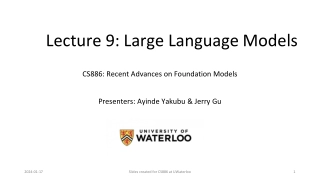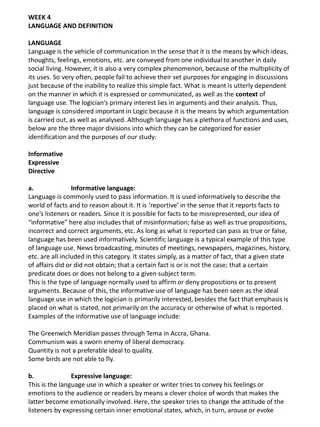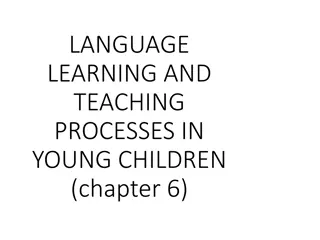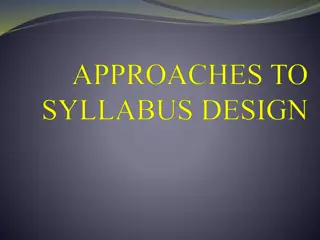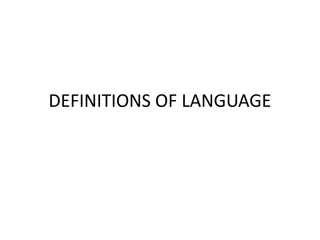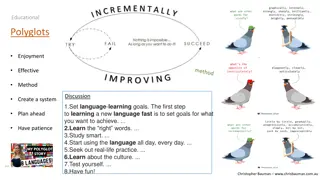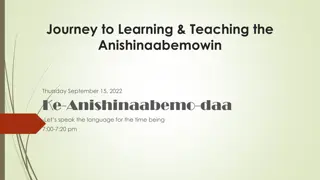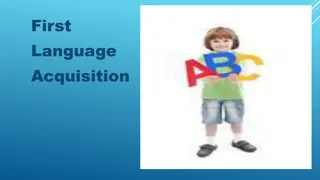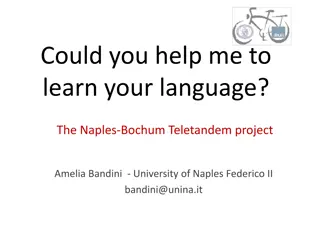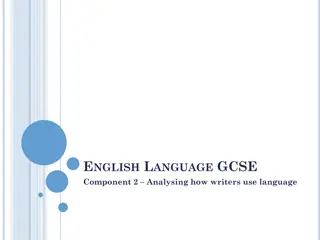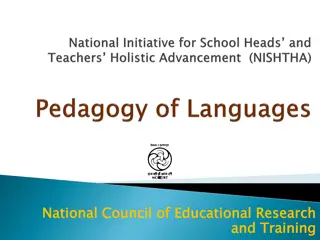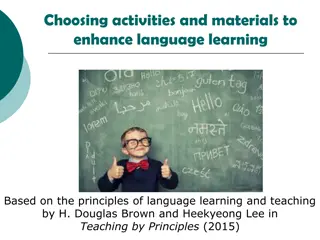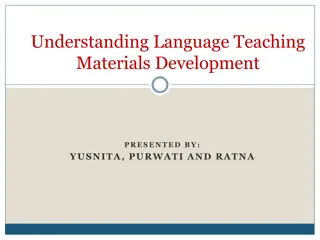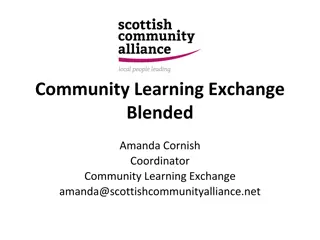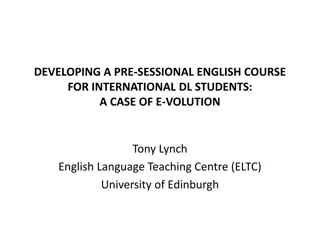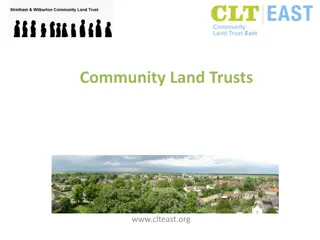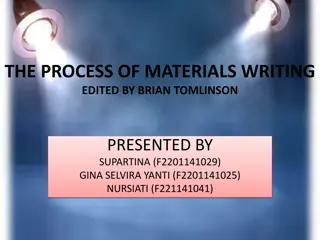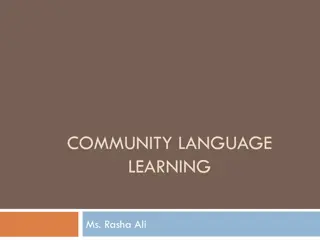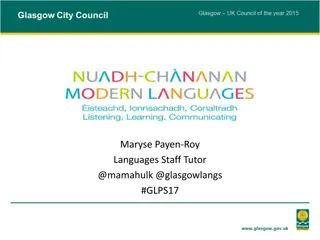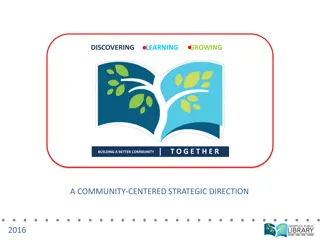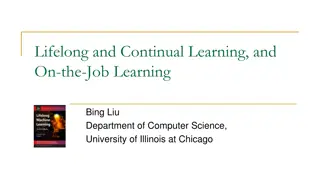Community Language Learning
Community Language Learning (CLL) involves collaborative language learning where teachers act as counselors and learners work together. CLL teachers aim to teach communicative language skills, foster self-learning, and mutual learning among students through valuing thoughts and feelings. Popular
2 views • 14 slides
Career Opportunities and Challenges in Translation & Interpreting Pedagogy Post-Pandemic
The APTIS 2022 conference explores new avenues in Translation and Interpreting (T&I) pedagogy amidst a changing landscape. Dr. Bego A. Rodriguez highlights emerging roles for T&I graduates. The context reveals a decline in language learning in the UK, impacting the Language Service Industry. The UK'
0 views • 13 slides
Recent Advances in Large Language Models: A Comprehensive Overview
Large Language Models (LLMs) are sophisticated deep learning algorithms capable of understanding and generating human language. These models, trained on massive datasets, excel at various natural language processing tasks such as sentiment analysis, text classification, natural language inference, s
2 views • 83 slides
Language Study Community – Enhance Your Language Skills
Joining a Language Study Group is a fantastic way to take your language learning to the next level. By leveraging the power of Group Study, you can immerse yourself in the language, enhance your understanding, and build confidence in your speaking abilities. Read full article \/\/explainlearning.com
1 views • 3 slides
Academic Language Demands and Supports in Instructional Planning
Academic Language Demands and Supports are crucial in educational settings to ensure comprehension and usage of language by students. This content discusses embedding language demands in lesson plans, providing language supports, and peer review activities to enhance academic language skills. The fo
6 views • 10 slides
The Significance of Media in Language Learning
Media plays a crucial role in language learning by raising awareness of the ideology behind linguistic structures and providing valuable information on society and culture. Linguists are drawn to media language for research purposes and to understand its impact on language use and attitudes. Media s
12 views • 5 slides
Understanding Translation: Key Concepts and Definitions
Translation involves transferring written text from one language to another, while interpreting deals with oral communication. Etymologically, the term "translation" comes from Latin meaning "to carry over." It is a process of replacing an original text with another in a different language. Translat
11 views • 76 slides
Language and Communication in Society: Understanding Interactions
Explore the intricate relationship between language and society through lectures focusing on language in interaction, power dynamics, language contact and change, public space discourse, linguistic landscaping, and more. Delve into the shift from structural linguistics to societal communication, red
6 views • 28 slides
Understanding Language: Informative, Expressive, and Directive Uses
Language serves as a vital medium for communication, allowing the conveyance of ideas, thoughts, and emotions. It is a complex phenomenon with diverse uses. This text delves into the three major divisions of language use - informative, expressive, and directive. Informative language conveys facts, w
4 views • 6 slides
Language Learning and Teaching Processes in Young Children
Development of language in young children is influenced by various factors such as their cultural and linguistic environment, unique characteristics, and interactions with adults. Optimal language development requires language stimulation from the environment. Varied cultural practices impact langua
1 views • 51 slides
Understanding Language in Stoicism: Significance and Corporeality
Language in Stoicism plays a crucial role in the process of assenting to impressions by focusing on corporeality, reason, and truth. It distinguishes between the mundane vocal sounds, articulated speech, and significant language to convey meanings effectively. The significance of language lies not i
2 views • 13 slides
Understanding Language Teaching Syllabus: Integration, Theory, and Approaches
Language Teaching Syllabus involves the integration of subject matter and linguistic elements, guided by theories of language and learning. Various approaches like Grammatical, Situational, Communicative, and Analytic are used to structure syllabi. Breaking language into parts aids in sequential lea
1 views • 28 slides
Exploring Language and Communication Through a Short Film
In this lesson, students will watch a 10-minute short film titled "The Most Beautiful Thing" by Cameron Covell. They will reflect on the value of learning another language, analyze how facial expressions and body language convey emotions, and develop empathy towards those facing language barriers or
0 views • 29 slides
Various Definitions of Language Throughout Linguistic History
Different linguists and scholars have offered various definitions of language over time. Sapir (1921) emphasized language as a method of communicating ideas, emotions, and desires through voluntary symbols. Bloch and Trager (1942) focused on the social aspect of language as a system of vocal symbols
1 views • 12 slides
Enhancing Language Learning Across the Curriculum in B.Ed. 1st Year Course
Language Across the Curriculum (LAC) emphasizes that language learning should occur across all subjects, not just in language classrooms. It highlights the importance of incorporating language development into every learning activity, fostering multilingualism in schools. Language plays a crucial ro
2 views • 34 slides
Effective Language Learning Strategies and Tips
Discover effective methods to enhance your language learning experience, including setting goals, expanding vocabulary, studying efficiently, immersing yourself in the language, seeking real-life practice, exploring the culture, testing your knowledge, and most importantly, having fun along the way.
0 views • 4 slides
Journey to Learning & Teaching the Anishinaabemowin - By Isadore Ignatius Bebamikwe/Toulouse
Explore the journey of Isadore Ignatius Bebamikwe/Toulouse in learning and teaching Anishinaabemowin, the first language of the Anishinabek Nation. Discover the rich cultural and linguistic heritage of the Great Lakes region through distinct language groups - Ojibwe, Potawatomi, and Odaawa Nations.
0 views • 27 slides
Experiential Learning Portfolio Program at Barry University
Experiential Learning Portfolio Program at Barry University's School of Professional and Career Education (PACE) offers a unique opportunity to earn college credit for learning gained from work and community service experiences. Through this program, students can showcase their experiential learning
0 views • 16 slides
Understanding First Language Acquisition Process
First language acquisition is the process through which humans develop the capacity to perceive, comprehend, and effectively use language to communicate. It primarily focuses on infants acquiring their native language. Basic requirements, caregiver speech features, and the acquisition schedule play
0 views • 19 slides
Innovative Learning Management System - LAMS at Belgrade Metropolitan University
Belgrade Metropolitan University (BMU) utilizes the Learning Activity Management System (LAMS) to enhance the learning process by integrating learning objects with various activities. This system allows for complex learning processes, mixing learning objects with LAMS activities effectively. The pro
4 views • 16 slides
Early Childhood Language Learning and Bilingualism
Early childhood is a critical period for language acquisition and the development of bilingualism. Exposure to multiple languages from a young age has significant cognitive benefits. Bilingualism is a common phenomenon worldwide, with many individuals speaking more than one language. The cognitive i
0 views • 109 slides
Enriching Language Learning with Teletandem Activities: A Blended Approach
The Naples-Bochum Teletandem project led by Amelia Bandini at the University of Naples Federico II focuses on enhancing German language courses through a blended learning approach. The project aims to combine formal instruction with informal language learning environments to enrich students' cultura
3 views • 27 slides
Speech and Language Developmental Milestones: A Bilingual/Multilingual Perspective
Speech and language developmental milestones are crucial for children, regardless of their home language. These milestones encompass receptive language, expressive language, pragmatics, and articulation and phonology. Understanding how a child hears and talks from birth to one year is essential, as
1 views • 23 slides
Analyzing Writer's Language Use in English Language GCSE Component 2
In English Language GCSE Component 2, students learn to analyze how writers use language. The learning objective focuses on commenting, explaining, and analyzing language use with relevant subject terminology. The exam assesses students on their ability to interpret and explain a writer's thoughts,
0 views • 12 slides
Language Education in Diverse Indian Contexts: Strategies and Challenges
The content explores various aspects of language education, focusing on language pedagogy, multilingualism, language skills teaching, assessment processes, and addressing diverse learner needs in the Indian educational context. It emphasizes the importance of integrating skills for literacy and lang
0 views • 23 slides
Enhancing Language Learning through Effective Classroom Practices
Explore the principles of language learning and teaching by Brown and Lee in "Teaching by Principles" (2015). Discover how automaticity, transfer, and task design impact language acquisition in the classroom. Emphasize meaningful interactions, purposeful tasks, and the balance between controlled and
0 views • 33 slides
Exploring Language Teaching Materials Development
Language teaching materials play a crucial role in language learning processes. They can be informative, instructional, experiential, eliciting, or exploratory. Materials development involves various processes such as evaluation, adaptation, design, production, exploitation, and research. Frameworks
0 views • 30 slides
Community Learning Exchange Blended: Empowering Community Groups
Discover how the Community Learning Exchange (CLE) offers community groups a realistic and funded opportunity for shared learning. Administered by the Scottish Community Alliance, the CLE has adapted to virtual formats during lockdowns while working on a blended version for future flexibility. Explo
0 views • 13 slides
Introduction to Language Technologies at Jožef Stefan International Postgraduate School
This module on Knowledge Technologies at Jožef Stefan International Postgraduate School explores various aspects of Language Technologies, including Computational Linguistics, Natural Language Processing, and Human Language Technologies. The course covers computer processing of natural language, ap
0 views • 27 slides
Enhancing English Language Support for Online Distance Learning Students at University of Edinburgh
University of Edinburgh's English Language Teaching Centre developed an Online Academic Presessional Language course (OPAL) to support Online Distance Learning (ODL) students. The course focused on academic writing to enhance written accuracy and appropriacy, using existing ELTC materials. Research,
0 views • 27 slides
Exploring Sociolinguistics: Language Variation and Social Factors
Sociolinguistics delves into the study of language variation influenced by social factors, examining the relationship between language and its social context. It explores various aspects like standard pronunciation, language choice, speech acts, language components, language variety, and factors suc
0 views • 73 slides
Understanding Assembly Language Programming for Computing Layers
Assembly language is a low-level programming language that enables direct interaction with a computer's hardware components. This content explores the fundamentals of assembly language, the relationship between human-readable machine language and binary code, an assembly language program for multipl
0 views • 31 slides
Understanding Language Anxiety in Foreign Language Learning and Teaching
Explore the impact of language anxiety on students and teachers in foreign language learning and teaching contexts through insights from Dr. Christina Gkonou's research. Delve into the theoretical background, implications for language education, and real-life experiences shared at the Essex Language
0 views • 25 slides
Community Land Trusts: Empowering Communities through Collective Ownership
Community Land Trusts (CLTs) are legal entities run by local volunteers to collectively own and manage property/land, undertake development projects, and secure assets for the community. With priorities set by communities to address local issues like affordable housing and recreation, CLTs provide a
0 views • 13 slides
Issues and Insights in Materials Writing for Language Learning
Problems and perspectives in materials writing for language learning are explored through the lens of educators and learners, highlighting challenges and cultural considerations in creating effective language resources. From addressing real-world language needs to navigating cultural nuances, the pr
0 views • 52 slides
Effective Community Language Learning Method by Ms. Rasha Ali
Community Language Learning (CLL) method emphasizes understanding students' feelings and creating a supportive environment for language learning. This approach, influenced by the Counseling-Learning approach, focuses on building relationships, reducing anxiety, and promoting effective communication
1 views • 15 slides
The Role of Play in Language Learning and the Critical Age Theory
The critical age theory suggests that young children have greater brain plasticity for language internalization, while adults can learn L2 faster due to developmental stages. Learning a second language early provides advantages in accent acquisition. Affective relationships and play are crucial in l
0 views • 15 slides
Community-Centered Strategic Direction for Building a Better Community
Discovering, learning, and growing together to formulate a community-centered strategic direction in 2016. Leaders focus on what they believe in - connecting, learning, innovating, and collaborating. Their purpose is to inspire the community through enrichment and engagement. Their vision is a vibra
0 views • 6 slides
Factors Influencing Language Acquisition in Learners
Factors such as affect, motivation, self-confidence, anxiety, and attitude play crucial roles in language learners' acquisition process. High motivation, self-confidence, and low anxiety levels enhance effective language acquisition, while positive attitudes towards learning facilitate seeking and p
0 views • 10 slides
Lifelong and Continual Learning in Machine Learning
Classic machine learning has limitations such as isolated single-task learning and closed-world assumptions. Lifelong machine learning aims to overcome these limitations by enabling models to continuously learn and adapt to new data. This is crucial for dynamic environments like chatbots and self-dr
0 views • 32 slides


